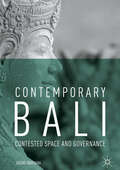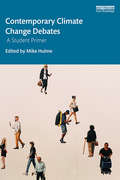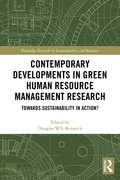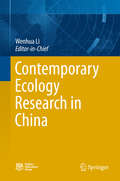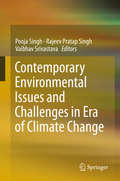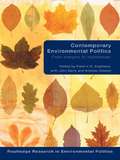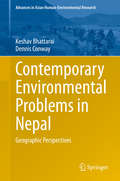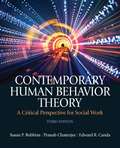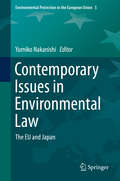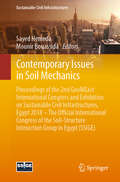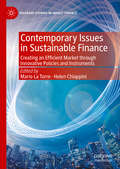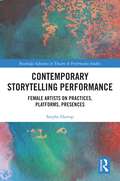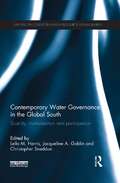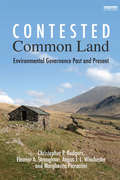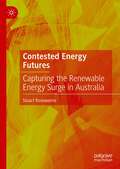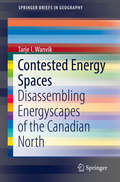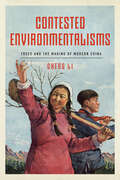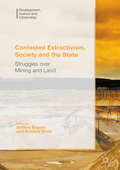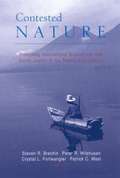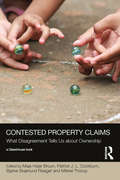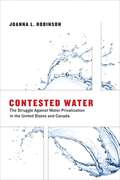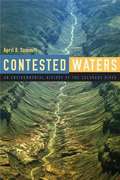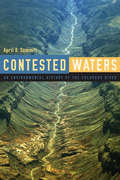- Table View
- List View
Contemporary Bali: Contested Space and Governance
by Agung WardanaThis book offers a comprehensive examination of spatial and environmental governance in contemporary Bali. In the era of decentralisation, Bali's eight district governments and one municipality acquired a strong sense of authority to extract revenues from within their territorial borders while disregarding the impacts beyond them which has exacerbated environmental, cultural and institutional issues. These issues are addressed through reorganising space. In reality, however, such re-organisation has predominantly been in order to provide space for tourism investments and market expansion. The outcomes of reorganising space are in fact shaped by the dynamics of power that interface with increasingly complex legal and institutional structures. These complex structures provide more arenas for vested interests to manoeuvre, but at the same time provide different forms of legitimacy for local forces to challenge the dominant process. The book demonstrates the mechanisms through which social actors mobilise legal-institutional arrangements to advance their interests.
Contemporary Climate Change Debates: A Student Primer
by Mike HulmeContemporary Climate Change Debates is an innovative new textbook which tackles some of the difficult questions raised by climate change. For the complex policy challenges surrounding climate migration, adaptation and resilience, structured debates become effective learning devices for students. This book is organised around 15 important questions, and is split into four parts: What do we need to know? What should we do? On what grounds should we base our actions? Who should be the agents of change? Each debate is addressed by pairs of one or two leading or emerging academics who present opposing viewpoints. Through this format the book is designed to introduce students of climate change to different arguments prompted by these questions, and also provides a unique opportunity for them to engage in critical thinking and debate amongst themselves. Each chapter concludes with suggestions for further reading and with discussion questions for use in student classes. Drawing upon the sciences, social sciences and humanities to debate these ethical, cultural, legal, social, economic, technological and political roadblocks, Contemporary Debates on Climate Change is essential reading for all students of climate change, as well as those studying environmental policy and politics and sustainable development more broadly.
Contemporary Developments in Green Human Resource Management Research: Towards Sustainability in Action? (Routledge Research in Sustainability and Business)
by Douglas W.S. RenwickThis book examines a new topic in Human Resource Management (HRM), green – or environmental – HRM, analysing the role humans play in environmental management at work and environmental behaviours at workplaces around the world. The book begins with a focus on negative workplace green behaviours (e.g. toxic chemical leaks, air pollution, contaminated waste etc.), and what such environmental problems mean for workers, managers and society as a whole. This book outlines relevant, underpinning academic theory and research literature on how HRM is ‘going green’, and details real-life organisational examples derived from original and secondary empirical research to illuminate the implications of adopting Green HRM practices for relevant stakeholders. In doing so, the book offers a new, academic contribution to both the HRM and environmental management literatures.
Contemporary Ecology Research in China
by Wenhua LiThe Chinese government is increasingly focusing on ecological construction and has subscribed to a national "Ecological Civilization Construction". Ecological research and protection practice develop so fast and achieve a lot at the national agenda. This book is a synthesis of five most exciting and dominant themes in contemporary ecological research in China: biodiversity, ecosystem management, degraded ecosystem restoration, global change and sustainable development. This book spans all the Earth's major ecosystems, such as forests, oceans, grasslands, wetlands, lakes, rivers, farmland and cities. This book provides a platform for scientific research across a variety of disciplines. It will be invaluable to experts, policymakers and local officers and will also be a highly useful resource for undergraduate and postgraduate students. This book will allow researchers, students and policymakers outside China to learn abou t the significant achievements and applications of ecological research within China.
Contemporary Environmental Issues and Challenges in Era of Climate Change
by Rajeev Pratap Singh Pooja Singh Vaibhav SrivastavaOver the last few decades, unprecedented global population growth has led to increased demand for food and shelter. At the same time, extraction of natural resources beyond the Earth’s resilience capacity has had a devastating effect on ecosystems and environmental health. Furthermore, climate change is having a significant impact in a number of areas, including the global hydrological cycle, ecosystem functioning, coastal vulnerability, forest ecology, food security, and agricultural sustainability. According to the Intergovernmental Panel on Climate Change (IPCC), only immediate and sustained action will prevent climate change causing irreversible and potentially catastrophic damage to our environment. This book presents various scientific views and concepts, research, reviews, and case studies on contemporary environmental issues in changing climate scenarios and highlights different adaptation measures. Increasing awareness of modern-day patterns of climate change, it addresses questions often raised by environmental scientists, researchers, policymakers and general readers.
Contemporary Environmental Politics: From Margins to Mainstream (Environmental Politics #Vol. 12)
by Andrew Dobson John Barry Piers H.G. StephensThis new collection from the leading journal, Environmental Politics, presents an excellent overview of the key themes found in contemporary green political thought since the early 1990s. Bringing together the journal's major work, this new book charts a fascinating period in which environmental politics developed from a marginal position in society and the academy, to its current place in the intellectual mainstream. Subdivided into clear sections on political theory, social movements, political economy and policy questions, and assisted by a contextualising introduction, this volume focuses on a set of clear themes: the character of green political theory relationships with other political traditions and theories origins and dynamics of contemporary environmental politics differences, similarities and tensions between the North and South the relationship of environmentalism to market economics and ecological modernization environmental aspects of distributive justice at the local, national and global levels the roles, value and valuing of nature in green theory and institutional practice. As a compilation, this book is unique. It delivers a snapshot of a variety of issues in the field, and is therefore ideally suited to teaching purposes, especially at postgraduate level. In addition, as each section is chronologically arranged, an evolution of related ideas can be clearly seen and appreciated, which builds an excellent understanding of the field of environmental politics
Contemporary Environmental Problems in Nepal: Geographic Perspectives (Advances in Asian Human-Environmental Research)
by Dennis Conway Keshav BhattaraiThis monograph examines contemporary environmental challenges facing Nepal, this landlocked country’s representativeness in the wider South Asian context is both distinct and generalizable. In large part, this is because of its extremes of physiographical structure- plains, hill ranges, mountainous massifs - and wide range of altitudinal terrains, which represent and replicate South Asian and East Asian continental conditions differing as markedly as humid tropical lowlands, sub-tropical hill ranges and temperate to sub-arctic mountainous environments. Associated forest regimes, in which deforestation and reforestation patterns have evolved in recent times, and differing densities of settlement and cleared agricultural landscapes in each of these altitudinal zones, add to the environmental diversity of Nepal. Associated fauna and exotic species are in various states of endangerment especially Bengal tigers, one horned rhinos, wild elephants, crocodile, musk deer, and peasants, to name a few- so that their forested and mountainous habitats as ‘Wild Life Reserves’ also deserve our attention, and are featured in this monograph’s remit.
Contemporary Environmentalists
by Kevin GrahamHere are ten men and women whose contributions to the environmental movement have significantly changed how we see and think about the world. Profiles: Jacques-Yves Cousteau, Anita Roddick, Vo Quy, Neca Marcovaldi, David Brower, Thomas Odhiambo, Gro Harlem Brundtland, Randy Hayes, Joseph Krecek, and Michael Bloomfield.
Contemporary Human Behavior Theory: A Critical Perspective for Social Work
by Susan P. Robbins Pranab Chatterjee Edward R. CandaContemporary Human Behavior Theory: A Critical Perspective for Social Work, 3e approaches HBSE from a comparative theory perspective, providing coverage of the most current and contemporary theories as well as traditional theories. It includes contemporary developments in traditional lifespan theory, theories of political economy, and a separate chapter on transpersonal theory. Each chapter includes coverage of the research that supports a particular theory, an analysis of the validity of that research, and a discussion of updated "Contemporary Issues. " The text encourages students to develop critical thinking skills in analyzing and comparing theories.
Contemporary Issues in Environmental Law: The EU and Japan (Environmental Protection in the European Union #5)
by Yumiko NakanishiThis book presents a variety of articles on contemporary issues in environmental law by eminent university professors of environmental law, international public law, European Union law, and comparative law in Europe and Japan. It is the first book in the field of environmental law based on the results of international conferences and research activities supported by the European Union delegation in Japan. Current essential and global topics such as principles of environmental law, climate change, biodiversity, ethics pertaining to animal rights , nuclear safety regime after Fukushima, environmental impact assessments, protecting international waters, genetically-modified organisms, and implementing international instruments, and EU rules at the national level are discussed in light of the 2009 Treaty of Lisbon and other recent international treaties, by comparing the approaches taken by the EU, European countries, and Japan. As environmental law is not just a national issue but also a global one, it is important to understand and analyse various aspects of current environmental issues. This book is a response to such needs, and represents the joint work of five Japanese and four European (two German and two Italian) professors who have succeeded in creating something that is both unique and remarkable.
Contemporary Issues in Soil Mechanics: Proceedings of the 2nd GeoMEast International Congress and Exhibition on Sustainable Civil Infrastructures, Egypt 2018 – The Official International Congress of the Soil-Structure Interaction Group in Egypt (SSIGE) (Sustainable Civil Infrastructures)
by Mounir Bouassida Sayed HemedaThis volume is of interest to practical engineers. It discusses some contemporary issues related to soil mechanics in earthwork projects which are critical components in civil construction and often require detailed management techniques and unique solution methods to address failures. Being earth bound, earthwork is influenced by geomaterial properties at the onset of a project. Hence, an understanding of the in-situ soil properties is essential. Slope stability is a common problem facing earthwork construction, such as excavations and shored structures. Analytical methods for slope stability remain critical for researchers due to the mechanical complexity of the system. Striving for better earthwork project managements, the geotechnical engineering community continues to find improved testing techniques for determining sensitive properties of soil and rock, including stress-wave based, non-destructive testing methods. To minimize failure during earthwork construction, past case studies and data may reveal useful lessons and information to improve project management and minimize economic losses. This volume discusses these aspects using appropriate methods in a simple way. The volume is based on the best contributions to the 2nd GeoMEast International Congress and Exhibition on Sustainable Civil Infrastructures, Egypt 2018 – The official international congress of the Soil-Structure Interaction Group in Egypt (SSIGE).
Contemporary Issues in Sustainable Finance: Creating an Efficient Market through Innovative Policies and Instruments (Palgrave Studies in Impact Finance)
by Mario La Torre Helen ChiappiniSustainable investments, although not yet working under a comprehensive regulatory framework, represent a growing, worldwide phenomenon. Such growth reflects the renewed public and private interest in environmental issues such as climate change, poverty and financial inclusion, as well as growing support from conscious investors looking to finance environmental and social initiatives. However, despite the interest that sustainable investments are gaining among governors, investors and practitioners, important challenges remain that must be addressed. Comprising a collection of research presented at the 2nd Social Impact Investments International Conference, this contributed volume offers a global analysis of the current state of the sustainable finance sector, proposing solutions to challenging obstacles and exploring topics including impact investing, social impact bonds and green banking. Providing real-life case studies from Europe, Latin America and Africa, this book is an insightful and timely read for scholars interested in sustainable finance, social impact investing, development finance and alternative finance.
Contemporary Storytelling Performance: Female Artists on Practices, Platforms, Presences (Routledge Advances in Theatre & Performance Studies)
by Stephe HarropThis book focuses on a rising generation of female storytellers, analysing their innovation in interdisciplinary collaboration, and their creation of new multimedia platforms for story-led performance. It draws on an unprecedented series of in-depth interviews with artists including Jo Blake, Xanthe Gresham-Knight, Mara Menzies, Clare Murphy, Debs Newbold, Rachel Rose Reid, Sarah Liisa Wilkinson, and Vanessa Woolf, while Sally Pomme Clayton’s reflections on her extraordinary four-decade career provide long-term context for these cutting-edge conversations. Blending ethnographic research and performance analysis, the book documents the working lives of professional storytelling artists. It sheds light on the practices, values, aspirations, and achievements of a generation actively re-defining storytelling as a contemporary performance practice, taking on topics from ecology and maternity to griefwork and neuroscience, while working collaboratively with diverse creative partners to generate new, inclusive presences for a traditionally-inspired artform. This book will be of great interest to students, scholars, and practitioners in drama, theatre, performance, creative writing, education, and media.
Contemporary Water Governance in the Global South: Scarcity, Marketization and Participation (Earthscan Studies in Water Resource Management)
by Leila M. Harris, Jacqueline A. Goldin and Christopher SneddonThe litany of alarming observations about water use and misuse is now familiar—over a billion people without access to safe drinking water; almost every major river dammed and diverted; increasing conflicts over the delivery of water in urban areas; continuing threats to water quality from agricultural inputs and industrial wastes; and the increasing variability of climate, including threats of severe droughts and flooding across locales and regions. These issues present tremendous challenges for water governance. This book focuses on three major concepts and approaches that have gained currency in policy and governance circles, both globally and regionally—scarcity and crisis, marketization and privatization, and participation. It provides a historical and contextual overview of each of these ideas as they have emerged in global and regional policy and governance circles and pairs these with in-depth case studies that examine manifestations and contestations of water governance internationally. The book interrogates ideas of water crisis and scarcity in the context of bio-physical, political, social and environmental landscapes to better understand how ideas and practices linked to scarcity and crisis take hold, and become entrenched in policy and practice. The book also investigates ideas of marketization and privatization, increasingly prominent features of water governance throughout the global South, with particular attention to the varied implementation and effects of these governance practices. The final section of the volume analyzes participatory water governance, querying the disconnects between global discourses and local realities, particularly as they intersect with the other themes of interest to the volume. Promoting a view of changing water governance that links across these themes and in relation to contemporary realities, the book is invaluable for students, researchers, advocates, and policy makers interested in water governance challenges facing the developing world.
Contes De Mer
by Steve VernonSept histoires de mer sinistres qui vous feront vraiment flipper. Environ soixante-quinze de la planète sont recouvertes d'eau, et quatre-vingt-dix-sept se trouvent dans la mer. Les habitants de provinces maritimes vous diront que c’est une histoire pour chaque vague qui s'est jamais échoué sur le rivage. Ici sont sept d’entre eux. «Dans l’Obscurité et les Profondeurs», offre un récit très obsédant du devoir de convoi de la Seconde Guerre mondiale et d'un marin qui a fait et tenu une terrible affaire. «La Sirène d’Harry», vous présente un groupe des hommes sans abri qui ont attrapé quelque chose qui Pourrait être une sirène. Si cela ne vous en dit pas assez sur cette histoire, essayez d'imaginer ce que serait le CANNERY ROW de Steinbeck lirait s'il avait été écrit par HP Lovecraft. «Je sais Pourquoi les Eaux de la Mer ont le Goût du Sel,» est l'histoire d'un pilote suicide de l'armée de l'air japonaise basé à Okinawa et de sa rencontre avec un monstre marin - en quelque sorte. «L’Histoire de Finbar» est un sombre conte fantastique sur les courants profonds qui tourbillonnent et coulent à l'intérieur des courants calmes et profonds du cœur froid d'un homme. «La femme qui a perdu sa dent parce qu'elle riait trop fort de la mer», est une petite fable tranquille d'eau salée, de larmes et de regrets. «Entre Vous Savez Qui et le Bleu Foncé Profond» est l'histoire du dernier marché sur terre. Cette collection commence par une bonne affaire et se termine par une bonne affaire - ce qui me semble être une sacrée bonne affaire.
Contested Common Land: Environmental Governance Past and Present
by Christopher P. Rodgers Eleanor Straughton Angus J.L. Winchester Margherita PieracciniThis innovative and interdisciplinary book makes a major contribution to common pool resource studies. It offers a new perspective on the sustainable governance of common resources, grounded in contemporary and archival research on the common lands of England and Wales - an important common resource with multiple, and often conflicting, uses. It encompasses ecologically sensitive environments and landscapes, is an important agricultural resource and provides public access to the countryside for recreation. Contested Common Land brings together historical and contemporary legal scholarship to examine the environmental governance of common land from c.1600 to the present day. It uses four case studies to illustrate the challenges presented by the sustainable management of common property from an interdisciplinary perspective - from the Lake District, Yorkshire Dales, North Norfolk coast and the Cambrian Mountains. These demonstrate that cultural assumptions concerning the value of common land have changed across the centuries, with profound consequences for the law, land management, the legal expression of concepts of common 'property' rights and their exercise. The 'stakeholders' of today are the inheritors of this complex cultural legacy, and must negotiate diverse and sometimes conflicting objectives in their pursuit of a potentially unifying goal: a secure and sustainable future for the commons. The book also has considerable contemporary relevance, providing a timely contribution to discussion of strategies for the implementation of the Commons Act of 2006. The case studies position the new legislation in England and Wales within the wider context of institutional scholarship on the governance principles for successful common pool resource management, and the rejection of the 'tragedy of the commons'.
Contested Energy Futures: Capturing the Renewable Energy Surge in Australia
by Stuart RosewarneThis book unpacks the politics of climate change in Australia in the context of successive conservative Coalition governments resisting any moves to mitigate emissions and as local communities and transnational corporations struggle with each other to control the transition to a sustainable energy future. As Australia has abundant clean energy resources in terms of solar and wind, the book offers a test case for study of the energy policy transition in the 21st century. It does so by using tools from political economy and sociology, teasing out public attitudes to renewable energy technologies and innovative infrastructure investments, unpacking the complex parameters of this historical debate, tracing the rise of household 'prosumers' and arguing the case for grassroots ownership of renewable infrastructure or 'energy sovereignty' - already pioneered by some isolated communities in Australia. The cultural and emancipatory benefits of cooperative ventures are well known. However, capitalism is not readily defeated by democracy. The promotion of individual households as 'virtual power stations', of 'smart technologies' and even of cryptocurrency into the energy transition innovative mix opens up ever new horizons for corporate control.
Contested Energy Spaces: Disassembling Energyscapes of the Canadian North (SpringerBriefs in Geography)
by Tarje I. WanvikThis authored brief discusses how to conceptualize the socio-material complexity of contested energy spaces in the Canadian North, specifically in the context of indigenous communities that have allowed industrial developments to occur on their lands despite the environmental and lifestyle consequences. By applying assemblage theory, the author identifies contested energy spaces as complex places or situations that need to be understood through geographical concepts of place, scale, and power. In 6 chapters, the book challenges preconceptions of indigenous peoples as victims by examining communities that favor industrial developments, and identifies instabilities in the Canadian North to analyze the power relations between industry, state and indigenous communities. The book will be of interest to undergraduate and graduate students, teachers and lecturers, and geography scholars.Chapter 1 introduces the concept of energy spaces, and addresses the main research question posed in the text; why do some indigenous communities support extractive industry developments on their traditional territories, despite substantial destruction of the local environment and traditional indigenous land use practices? Chapter 2 further elaborates on the conceptualization of contested energy spaces, and chapter 3 applies this to the study area in Alberta, Canada. Chapter 4 discusses the methodology of the research process, and chapter 5 presents empirical cases in Alberta, from the changing governance structures of energy spaces to the networking of local indigenous communities. Chapter 6 concludes the brief by summarizing he findings, and by offering advice to all stakeholders regarding the dangers of leaving government processes to market forces alone.
Contested Environmentalisms: Trees and the Making of Modern China
by Cheng LiFor decades, tree planting and forestry have been pivotal to Chinese environmentalism. During the Mao era, while forests were razed to fuel rapid increases in industrial production, the "Greening the Motherland" campaign promoted conservationist tree-planting nationwide. Contested Environmentalisms explores the seemingly contradictory rhetoric and desires of Chinese conservation from the early twentieth century through to the present. Drawing on literary, cinematic, scientific, archival, and digital media sources, Cheng Li investigates the emergence, evolution, and devolution of Chinese conservationist ideas. Combining literary, historical, and environmental studies approaches, he shows that these ideas acquired their value and assumed their power precisely because of their malleability and adaptability. Li historicizes authoritarian environmentalism and probes the global-local dynamics underlying conservationist ideas that energize environmental impulses in China. Examining ethnic borderlands, the Beijing political center, and China's growth on the world stage, this book demonstrates the strength of Chinese environmentalism to adapt and survive through tumultuous change lies in what seems to be a weakness: its inconsistency and contestation.
Contested Extractivism, Society and the State: Struggles over Mining and Land (Development, Justice and Citizenship)
by Bettina Engels Kristina DietzThis book empirically discusses recent struggles over land and mining, exploring state-society relations conflicts on various scales. In contrast with the existing literature, analyses in this volume deliberately focus on large-scale land use changes both in relation to the expansion of industrial mining and to agro-industry. The authors contend that there are significant parallels between contestations over different variants of resource extractivism, as they reflect the same global trends and processes. Chapters draw on critical theoretical approaches from political ecology, political economy, spatial theory, contentious politics, and the study of democracy. The authors not only provide empirical insights on actual resource struggles from different world regions based on in-depth field research, but also contribute to theory-building by linking concepts from various critical approaches to one another, developing a perspective for analysing struggles over resources related to current global crisis phenomena.
Contested Nature: Promoting International Biodiversity and Social Justice in the Twenty-First Century
by Patrick C. West Crystal L. Fortwangler Peter R. Wilshusen Steven R. BrechinThis book contends that effective biological conservation and social justice must go hand in hand.
Contested Property Claims: What Disagreement Tells Us About Ownership (Social Justice)
by Mikkel Thorup Maja Hojer Bruun Patrick Joseph Cockburn Bjarke Skærlund RisagerProperty relations are such a common feature of social life that the complexity of the web of laws, practices, and ideas that allow a property regime to function smoothly are often forgotten. But we are quickly reminded of this complexity when conflict over property erupts. When social actors confront a property regime – for example by squatting – they enact what can be called ‘contested property claims’. As this book demonstrates, these confrontations raise crucial issues of social justice and show the ways in which property conflicts often reflect wider social conflicts. Through a series of case studies from across the globe, this multidisciplinary anthology brings together works from anthropologists, legal scholars, and geographers, who show how exploring contested property claims offers a privileged window onto how property regimes function, as well as an illustration of the many ways that the institution of property shapes power relationships today.
Contested Water
by Joanna L. RobinsonAttempts by local governments to privatize water services have met with furiousopposition. Activists argue that to give private companies control of the water supply is to turnwater from a common resource into a marketized commodity. Moreover, to cede local power to a globalcorporation puts communities at the center of controversies over economic globalization. InContested Water, Joanna Robinson examines local social movement organizingagainst water privatization, looking closely at battles for control of local water services inStockton, California, and Vancouver, British Columbia. The movements in these two communities haddifferent trajectories, used different tactics, and experienced different outcomes. Robinsonanalyzes the factors that shaped these two struggles. Drawing on extensive interviews with movementactors, political leaders, and policymakers and detailed analysis of textual material, Robinsonshows that the successful campaign in Vancouver drew on tactics, opportunities, and narratives fromthe broader antiglobalization movement, with activists emphasizing the threats to local democracyand accountability; the less successful movement in Stockton centered on a ballot initiative thatwas made meaningless by a pre-emptive city council vote. Robinson finds that global forces arereshaping local movements, particularly those that oppose neoliberal reforms at the municipal level. She argues that anti--water privatization movements that link local and international concerns andbuild wide-ranging coalitions at local and global levels offer an effective way to counter economicglobalization. Successful challenges to globalization will not necessarily come from transnationalmovements but rather from movements that are connected globally but rooted in localcommunities.
Contested Waters
by April R. Summit"To fully understand this river and its past, one must examine many separate pieces of history scattered throughout two nations--seven states within the United States and two within Mexico--and sort through a large amount of scientific data. One needs to be part hydrologist, geologist, economist, sociologist, anthropologist, and historian to fully understand the entire story. Despite this river's narrow size and meager flow, its tale is very large indeed." --From the conclusion The Colorado River is a vital resource to urban and agricultural communities across the Southwest, providing water to 30 million people. Contested Waters tells the river's story-a story of conquest, control, division, and depletion. Beginning in prehistory and continuing into the present day, Contested Waters focuses on three important and often overlooked aspects of the river's use: the role of western water law in its over-allocation, the complexity of power relationships surrounding the river, and the concept of sustainable use and how it has been either ignored or applied in recent times. It is organized in two parts, the first addresses the chronological history of the river and long-term issues, while the second examines in more detail four specific topics: metropolitan perceptions, American Indian water rights, US-Mexico relations over the river, and water marketing issues. Creating a complete picture of the evolution of this crucial yet over-utilized resource, this comprehensive summary will fascinate anyone interested in the Colorado River or the environmental history of the Southwest.
Contested Waters: An Environmental History of the Colorado River
by April R. Summitt"To fully understand this river and its past, one must examine many separate pieces of history scattered throughout two nations--seven states within the United States and two within Mexico--and sort through a large amount of scientific data. One needs to be part hydrologist, geologist, economist, sociologist, anthropologist, and historian to fully understand the entire story. Despite this river's narrow size and meager flow, its tale is very large indeed." -From the conclusion The Colorado River is a vital resource to urban and agricultural communities across the Southwest, providing water to 30 million people. Contested Waters tells the river's story-a story of conquest, control, division, and depletion. Beginning in prehistory and continuing into the present day, Contested Waters focuses on three important and often overlooked aspects of the river's use: the role of western water law in its over-allocation, the complexity of power relationships surrounding the river, and the concept of sustainable use and how it has been either ignored or applied in recent times. It is organized in two parts, the first addresses the chronological history of the river and long-term issues, while the second examines in more detail four specific topics: metropolitan perceptions, American Indian water rights, US-Mexico relations over the river, and water marketing issues. Creating a complete picture of the evolution of this crucial yet over-utilized resource, this comprehensive summary will fascinate anyone interested in the Colorado River or the environmental history of the Southwest.
